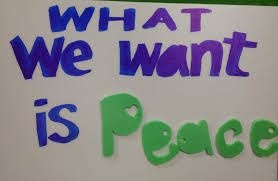Peace
What is Peace?
Peace is safety. Peace is non-violence. Peace is a feeling that no one will hurt your body or your feelings on purpose. With peace your rights are respected, your needs met. All people need peace.
Peace studies is an interdisciplinary academic field that draws on political science, sociology, history, anthropology, theology, psychology, philosophy, and other fields to:
1) understand the causes of armed conflict;
2) develop ways to prevent and resolve war, genocide, terrorism, gross violations of human rights; and
3) build peaceful and just systems and societies.
Peace has always been among humanity's highest values--for some, supreme. Consider: "Peace at any price .The most disadvantageous peace is better than the most just war.Peace is more important than all justice .I prefer the most unjust peace to the justest war that was ever waged. There never was a good war or a bad peace.
Peace campaigners typically argue that war arises from an imbalance in our relation with nature; that war is immoral; that it is unnatural; that it arises from conflicts which are petty and often illusory, and therefore resolvable by negotiation; that male chauvinism is a major part of the problem; that creating an anti-war and pro-justice culture will prevent fighting; that peace is achievable through forgiveness and that a lack of inner peace is the primary cause of conflict.
I’m going to start by looking at each of these conceptions. I will go on to consider the uncomfortable reality that war is attractive to many people, and probably to most of us at some time in our lives. And I will then offer my own conclusions for your consideration.
Yet, we agree little on what is peace. Perhaps the most popular (Western) view is as an absence of dissension, violence, or war, a meaning found in the New Testament and possibly an original meaning of the Greek word for peace, Irene. Pacifists have adopted this interpretation, for to them all violence is bad. This meaning is widely accepted among irenologists and students of international relations. It is the primary dictionary definition.
Peace, however, is also seen as concord, or harmony and tranquility. It is viewed as peace of mind or serenity, especially in the East. It is defined as a state of law or civil government, a state of justice or goodness, a balance or equilibrium of Powers.
Such meanings of peace function at different levels. Peace may be opposed to or an opposite of antagonistic conflict, violence, or war. It may refer to an internal state (of mind or of nations) or to external relations. Or it may be narrow in conception, referring to specific relations in a particular situation (like a peace treaty), or overarching, covering a whole society (as in a world peace). Peace may be a dichotomy (it exists or it does not) or continuous, passive or active, empirical or abstract, descriptive or normative, or positive or negative.
The problem is, of course, that peace derives its meaning and qualities within a theory or framework. Christian, Hindu, or Buddhist will see peace differently, as will pacifist or internationalist. Socialist, fascist, and libertarian have different perspectives, as do power or idealistic theorists of international relations. In this diversity of meanings, peace is no different from such concepts as justice, freedom, equality, power, conflict, class, and, indeed, any other concept.
All concepts are defined within a theory or cognitive framework--what I have called elsewhere a perspective. Through a perspective peace is endowed with meaning by being linked to other concepts within a particular perception of reality; and by its relationship to ideas or assumptions about violence, history, divine grace, justice. Peace is thereby locked into a descriptive or explanatory view of our reality and each other.

The hope that the end of the Cold War would bring about a peaceful period in world history has not been fulfilled. Instead, this period has seen numerous conflicts, previously suppressed by the Communist regime, confrontation with the Eastern Bloc and the fear of nuclear war.
Peace research is needed now more than ever. Whereas in the past, work focused on armament and disarmament, détente and arms control, the central topic of research these days covers a broader range of subjects. Peace research now centres on the conflicts in Southeast Europe, in the Middle East and in Asia, the dangers of nationalism, the problems of European integration, the spread of weapons of mass destruction, environmental conflicts, the impoverishment of large areas of the world and terrorism.
Peace research aims to put forward proposals for how the causes of conflict can be recognised as early as possible, for how violence can be prevented and how political control can be put in place for solving the conflict. Peace research plays a major role in answering these questions, and the proposals are used by politicians at the national and local level, by unions, the Church, science, political parties and the media.
Most people are proud to be human beings. We are proud of what we have attained, and many receive awards and titles for what they have accomplished. I have received many myself, but I haven't even hung them up.
When a person is dying, we check their pulse and see if they are still breathing. Then we say, "He's still alive." That's the title—"alive"—that has been given to everyone. One day that title will be taken away. Right now we all have that title, but we don't recognize it.
It's just like seeing someone we know after many years and thinking, "I've seen this person somewhere before. Who is he? I don't recognize him." Don't we also look at ourselves and wonder, "I have seen you somewhere. It feels like I know you, but I don't recognize you"?
Recently I was speaking about peace, and someone asked me what I would say to the poor people in this world. Why? Don't poor people need peace? Is peace only for the wealthy? People think that a hungry person only needs bread. I've been hungry. I'm not saying that I didn't and don't need bread, but I also need peace, because this world does not exist only to fill the stomach.
Who needs to experience peace? Peace is not needed by trees. Peace is not needed by cats. Peace is not needed by dogs. Peace is needed by human beings because we can experience peace. We need it. Peace needs to be experienced in our hearts. Whether there's peace in the world or not, peace is definitely possible in our hearts.Today, we don't look at our faults; we look at everyone else's faults. We don't look at our weaknesses; we look at other people's weaknesses.
Audience Peace is not a philosophy. Peace is something that has to be experienced. Unless a person experiences it, everything is empty. No matter what you have done in your life, if you have not experienced peace, then everything feels empty, incomplete.In this life, we can light the lamp of peace. We can decorate the heart with the lamp of peace every day. Learn how to light that lamp. You can call to that peace, that joy, so that it comes to you.
All those corners where there is darkness can be filled with joy. Joy doesn't look at anyone's age, whether they are young or old. No matter what their condition, it is possible for every human being to feel joy. If you need to make an effort, then the effort should be to light the lamp of joy. This life should be filled with light, not darkness.
This is not for someone else. Every human being can fulfill their heart, can fulfill this life. This is the most beautiful thing that is possible in this life.
who Need Peace
1 Children Need Peace
Children need peace. Peace teaches children peaceful ways. This will help build a more peaceful world.
2 The Peaceful Womb
A child's first home is the womb. It is a peace place when...
There is good and healthy food.
The environment is calm and free from violence.
The child is wanted.
The environment is healthy: free from smoke, toxins and poisons.
The mom does not smoke, drink alcohol or take drugs because she does not want to give these to her baby.
The mom is at peace, so the peaceful rhythm of her heart is the first music to which the baby listens.
3 Birth as a Peaceful Passage
Each infant needs a peaceful place to be born. The mom and baby benefit when...
The mom and baby are surrounded by trusted and loved ones at birth. The birth space is comfortable.
The umbilical cord is cut only after it has stopped pulsing, unless it is medically necessary to cut it sooner for a safe birth.
The baby is placed on the mom's body, first on her belly, then by her breast, as soon as possible after the birth.
If the baby is a boy, remember, circumcision is not medically necessary.
4 The Peaceful Nursery
Babies feel the safety of peace when their needs are met. Here are some ways to help babies begin their lives peacefully.
If the mom is able to nurse or if bottle feeding, the baby should be fed lovingly and whenever hungry.
The baby is bathed, massaged, cuddled, rocked and sung to gently each day.
The sleeping baby is near caregivers at all times.
When the baby cries, attention is given for what is needed like feeding, diapers or holding.
The home is safe and secure, without screaming, mistreatment and violence.
The caregiver can get help or support when tired, sick or stressed.
5 The Peaceful Home
The home needs to be a peace zone! Children will learn what they see. Parents must show ways of peace and nonviolence. Here are some guidelines for raising peaceful children.
Never use corporal punishment. It hurts, scares and confuses kids. It teaches them that those who are bigger and stronger have a right to get what they want by hurting those who are smaller and weaker. Never spank, slap, smack, hit, shake or pull a child. Never deprive a child from getting food and water. Never stop a child from going to the bathroom. Never force a child to work when exhausted. Never keep a child from getting a good night's sleep. Never force a child to remain motionless. Never confine a child in a small space.
Listen to your children. Let them tell you how they feel and what they need. Respond in a caring way. You do not need to give them everything they ask for, but you can recognize their right to ask. Never shame or humiliate a child with mean words. Never call a child bad names. Never predict a bad life for a child. Never wish harm for a child. Never mock a child. Never scare or threaten a child with harm.
Never insult a child. Never call a child stupid. Never compare a child negatively to others. Never ignore or shut out a child with silence. Never treat a child as if she or he does not exist. Do not tell a child you wish he or she was dead, that you would be better off without him or her or that you never wanted him or her.
Try to give a healthy and balanced diet, filled with good, natural foods. Check for lead around where you live. Lead poisoning is dangerous. Have your child's lead levels tested if you suspect possible lead poisoning.
Seek medical treatment for accidents, including head injuries. Some brain injuries can lead to violent behavior.
Show your child love everyday. Play, play, play with your child. Laugh with your child. Read to your child. Hug your child. Tell your child, "I love you."
Set clear and safe limits for your child based on age.
Develop healthy habits and regular schedules, including enough sleep, daily exercise and relaxation.
A child needs love and support from the whole family: mom, dad, relatives, if possible, and from good friends. Allow a child to express love.
Wake a child in a kind and cheerful way. This will affect how the day starts!
Take an interest in and share activities. Let children explore and practice art, music, dance and sports. Teach them to swim. Try to limit violent entertainment. Help your children learn the difference between fantasy and reality. Talk about what you are seeing. Listen to each other's thoughts and feelings about it, too.
Read stories to your child about peace, honesty, justice and courage. Stories and reading can be better than television for the child's mental health.
Make sure your children are not exposed to and can never get to guns, explosives, alcohol or drugs. Remember, children need adult supervision.
Learn to settle your arguments with respect and peace.
Learn positive ways to express your anger.
Learn ways to calm down if you become too upset to be positive. Take a little time each day to get in touch with the peace in your heart.
Get help to heal from pain from your life so you do not pass it on to your children.
By your example and your words, teach your children to respect people from all walks of life.
Comfort your child when she or he is ill, hurt, sad, grieving, angry or scared.
Be patient with your child. It cannot be said enough -- be patient! Remember what it felt like when you were a child. Learn to motivate with the positive. Base your decisions on good judgment and cooperation rather than "because I said so." Share reasons why you have made your decisions. This will help a child's thinking and consideration.
Associate with good and peaceful people. Learn and share ways of peace with peaceful people.
Treat boys and girls equally. Help them to express their feelings so that they may get their needs met. Support children in being loving, compassionate, and strong.
Teach children about their feelings, body and sexuality. Help them learn to avoid abuse and abusive people. Teach children to use their own thinking brains.
Remember, sometimes children may not know why they are acting as they are. They may not always know or be able to tell you what they are feeling. It is your job to help them figure it out.
Respect that each child is unique and special. Value each child's ways.
Protect your child from abuse and violence. Never neglect your child.
Build trust with your child so that she or he will want to talk with you about what is happening. Support children, even when they make mistakes. Mistakes can help us grow. Look for and talk about the positive in every experience.
The Peaceful Community
6 What can you do in your community?
Build friendships and networks to make the community safe for all. Deal with the problems in your community: drugs, gangs, police brutality, neglect, abuse, racism, crime, corruption and unemployment.
Organize to stop violence. Organize to protect all the children.
Call the police if you see violence.
If there are gangs in the area, supervise children. Help children stay involved in learning, sports or other activities to avoid empty time that might lead them to gangs. Support your child in NOT picking gangs.
Talk to other parents for support.
Get involved in school. Protect your children from bullying. Get authorities involved to stop all bullying.
Encourage the schools to teach communication skills, peaceful ways to resolve conflict and negative feelings. Teach nonviolent parenting skills.
If you see an adult about to hit a child, speak up in a peaceful manner. Let the adult know there are better, nonviolent ways to raise a child. Let the child know you care about her or his feelings and rights.
Accept and respect people and their differences -- ethnic, religious, sexual, racial, gender, age and nationality.
The Peaceful World
What can you do for peace in the wider world?
Do whatever you can in the circles of your life, your home and your community to raise safe and peaceful children. Know that this is one of the best things you can do for peace in the world.
Take a stand against violence, injustice and war. Children feel better when they see their parents stand up for what is right.
Work with others for legal changes that will support peace, justice, human rights and the environment. Peace depends on us! And, the children depend on us!
Thank you




